 |
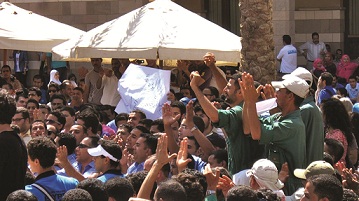 | 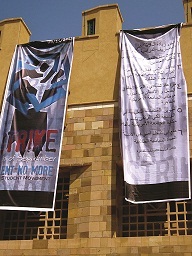 |
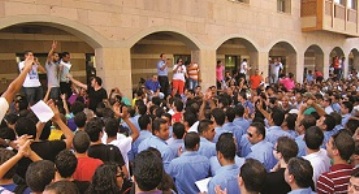 |
On-campus protestors and administration reach agreement on issues of concern
"Students and workers are one hand!"The chants echoed across AUC's
New Cairo campus as students,
custodial staff, security guards and landscape
workers came together in a show of solidarity.
For more than a week, students and workers
congregated in front of the Administration
Building in protest of an increase in tuition fees,
as well as employee compensation and benefits.
The movement's set of demands included rescinding the 9 percent increase in tuition fees and placing a cap on tuition, in addition to student representation in any decisions that directly affect the student body, improvement of the registration process and access to the University budget. Custodial, security and landscape workers were calling for salary adjustments, change of uniforms and transportation services, two-day weekends and hiring temporary staff.
Over the course of its 92-year history, The
American University in Cairo witnessed a
number of protests in response to administrative
decisions and political events. In October 1977,
students contested an increase in dorm rent fees,
where they went from LE 18 to LE 30. In April
1983, students protested a proposed increase in
tuition fees and managed to bring them down
from an increase of 21.2 percent to 18.5 percent.
The AUC student body also disputed increases in
photocopying prices and tuition fees in February
and March of 1989. In 1992, protests were staged
in demand of greater student representation in
administrative affairs. The negotiations resulted in
the administration's agreement to involve student
representatives within the Budget Review
Committee and the Admissions Committee, as
well as promises to review alleged excessive
profits made by the AUC Bookstore. In addition,
AUC students took a political stance in 1994 and
1996, when they demonstrated against Israel's
Hebron Mosque Massacre, which resulted in 60
deaths and 200 injuries, as well as Israeli attacks
on south Lebanon. In October 2010, custodial
staff went on strike in demand of better pay.
In a message to the AUC community, President Lisa Anderson reaffirmed the University's freedom of expression policy. "The University is committed to a freedom of expression policy that recognizes the right of all members of the AUC community to express their views as they wish, as long as they do not do so in such a way as to disrupt University activities or damage University property," she said.
As part of its firm belief in individual liberty, AUC recently revised its freedom of expression policy, giving AUC community members the right to distribute printed material, offer petitions for signature and make speeches outside University buildings without prior approval or notification. Protests and demonstrations are allowed on campus without prior consent, but require advance notification. Catalyzed by changes taking place in Egypt, the new policy preserves and maintains freedom of expression on campus, particularly in light of recent strikes conducted by students and University employees.
Mona Amer '98, assistant professor of psychology and a member of the task force that devised the policy, said, "It is important to note that the previous policy was focused only on student activities, whereas the new policy is a general policy applicable to all members of the AUC community, including staff, faculty and the administration."
This eventful week on campus witnessed open forums with the AUC community, students bringing down the American flag, and a general interruption to some classes and activities on campus. However, on Monday, September 19, a different atmosphere prevailed on campus as the administration and protestors came to an agreement on ways to address the issues raised.
In response to student demands, the administration agreed to work with students, faculty, staff, parents and alumni, together with the Senate Budget Committee, in developing the University budget for the following year. In addition, an ad hoc committee was formed to investigate the financial aspect of student demands. The committee will examine how tuition increases are calculated and will outline different models and mechanisms of payment. The committee will also look into the fees students are charged for additional services on campus, submitting proposals on how such fees may be adjusted, without having a negative impact on the budget.
On the side of the workers, a study is underway to examine the possibility of transitioning to a five-day work week. Meanwhile, all workers have been given two-day weekends twice a month. Security staff members also received a LE 250 increase, bringing their minimum wage to LE 1,500. Furthermore, the administration has approved the landscape workers' requests to change uniforms and contract with a different transportation service provider.
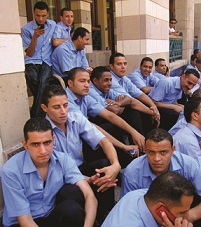 |
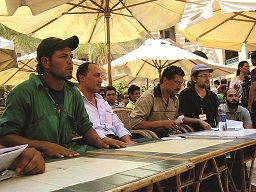 |
To address similar issues over the
long term, the AUC administration
has established permanent channels
through which grievances may be
received and processed. Working
under the ombuds office, a University
ombudsperson will be responsible for
neutral and impartial dispute
resolution, providing confidential and
informal assistance to constituents of
the AUC community, including
students, staff, faculty and
administrators. The office is a means
of protecting against abuse, bias and
other improper treatment or
unfairness, and is independent of existing administrative structures,
reporting directly to the president.
Furthermore, a permanent Labor
Rights Oversight Committee has
been established, to which aggrieved
staff members can turn for review of
their claims of unfair treatment,
including wrongful termination. The
committee is composed of members
of the administration, staff
representatives nominated by an
independent staff syndicate, and a
faculty member and student chosen
jointly by the administration and the independent syndicate.
Landscape staff, represented in
negotiations by Desert Development
Center worker Antar Nageh, remain
watchful over the outcome of the
agreement. "The administration has
promised us some good things," noted Nageh. "We're now waiting to
see how they will transpire. The
change in uniforms and bus service
was a good concession, but we'd like
to see how salary adjustments work
out for us."
Online, a festive mood dominated
on the AUC Strike Facebook page,
which managed to garner more than
1,300 fans. Often referred to as "a
day of victory" and the day in which "the sun has started to rise," AUC
student Mohamed Allam commented
on Facebook saying, "Today was
about victory. It's not only about
victory; it's about the beginning of
the victory. We fought much, and we
had an outcome. It will always be
September 19th that will be
remarkable in AUC history."
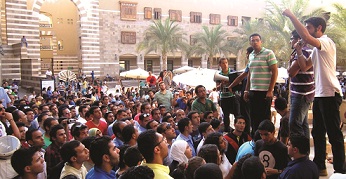 | 
|
Randy Marsh, an AUC graduate law student who participated in the formulation of the University's new freedom of expression policy, said he is not fully convinced by some of the demands presented by students. As a result, he established a Facebook page, AUCians Not Supporting the Strike. Explaining his stance, he noted on Facebook, "AUC is a private, nongovernmental University and, therefore, is not in any way affiliated with a requirement to fulfill affordable, accessible higher education. It is a competitor to the state-issued universities. [Students] don't have a right to determine what [the University offers] and at what price. You can select among the options given to you and pick the one that best meets your standards of cost and services."
Behind this movement, students were represented by delegates from the Student Union, while a newly formed independent syndicate spoke on behalf of custodial and landscape workers. Membership to the syndicate is open to those serving the University for a minimum of one year. "We are looking for equity and transparency, and hoping to act as a link between senior management and employees," said Mostafa El Sebaie, senior manager of grants and major purchases and head of the syndicate. "We hope to be able to resolve conflicts and help employees have fair compensation, excellent medical services and additional benefits."
Echoing the same sentiment, Waleed Shibl, AUC custodial worker and syndicate representative, noted, "We want to achieve true community representation. While we have kept protests as a last resort, and while the fact that the issues in discussion are years old and cannot be solved instantaneously must be acknowledged, we are pleased with the progress made so far. We're hoping for more positive decisions soon."
According to the protestors and syndicate members, below these specific requests lies a fundamental goal –– to unify the AUC community and ensure equality and homogeneity within. "As a community, we managed to create unity from diversity, which is a rather difficult thing to accomplish," said Ahmed Alaa, president of the Student Union. "I believe that the biggest accomplishment here is the fact that we got the administration to listen to our demands. We now know we have the power to convince and negotiate. It is imperative that there be trust, transparency and two-way communication between students and the administration. Once we have established these important principles, we will be able to resolve issues even before they surface."
Expressing her satisfaction with what has been achieved, President Anderson noted, "I am proud of these agreements, knowing that they entailed much work on the part of the administration, the syndicate, students and faculty, and that they represent a collective commitment to the welfare of AUC and to its continuing mission to be of service to Egypt. Still, we believe that this day marks the beginning of a new era of transparency and dialogue with the workers and their representatives to build together a more equitable workplace, and with the students and faculty to become the great University we aspire to be. AUC should represent a model of integrity and sustainability for the world. We have much to do, but there are many of us prepared to do it."
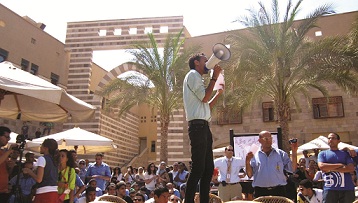 | 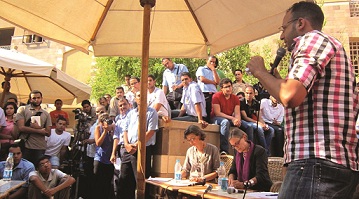
|
By Ghaydaa Fahim